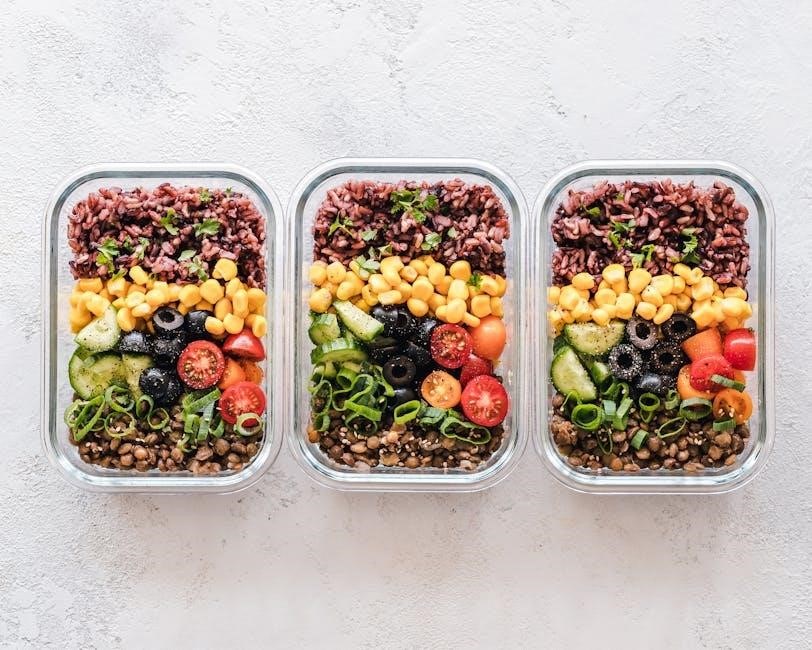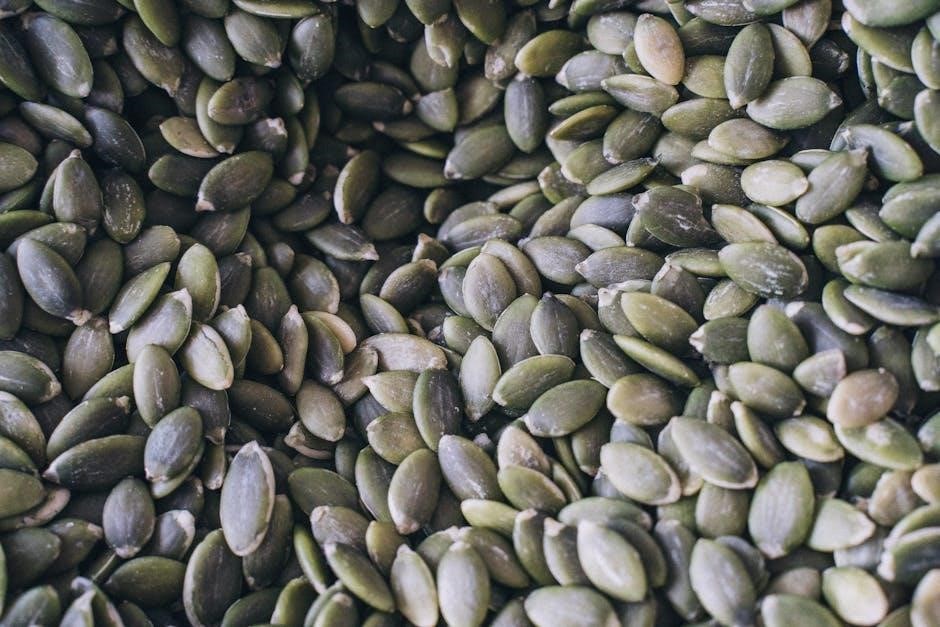Fatty liver disease is a common condition where excess fat accumulates in liver cells. Diet plays a crucial role in managing and reversing this condition.
1.1 What is Fatty Liver Disease?
Fatty liver disease occurs when excess fat accumulates in liver cells, often due to an unhealthy diet or being overweight. It is not caused by alcohol consumption. There are two main types: alcoholic fatty liver disease (ALD) and non-alcoholic fatty liver disease (NAFLD). NAFLD is the most common form and is closely linked to obesity, insulin resistance, and metabolic syndrome. Early stages may cause few symptoms, but if left untreated, it can progress to inflammation, scarring, or even liver failure. Diet and lifestyle changes are essential for managing and reversing early stages of fatty liver disease. A balanced diet plays a key role in reducing liver fat.
1.2 The Importance of Diet in Managing Fatty Liver
Diet plays a critical role in managing fatty liver disease, as it directly impacts liver fat accumulation and overall health. A well-structured diet helps reduce liver inflammation, improve insulin sensitivity, and promote weight loss, which are essential for reversing early-stage fatty liver. Incorporating whole, nutrient-rich foods like fruits, vegetables, lean proteins, and healthy fats supports liver function. Avoiding processed foods, sugary drinks, and saturated fats is equally important. A balanced diet not only aids in reducing liver fat but also helps maintain a healthy weight, lowering the risk of disease progression. Structured meal plans, such as the Mediterranean-style diet, are often recommended.

Causes and Risk Factors of Fatty Liver
Fatty liver disease often results from excess fat accumulation in liver cells, linked to obesity, poor diet, and metabolic issues. Risk factors include insulin resistance, high cholesterol, and alcohol consumption.
2.1 Overview of Fatty Liver Causes
Fatty liver disease is primarily caused by excessive fat accumulation in liver cells, often linked to obesity, poor diet, and metabolic syndrome. An unhealthy diet high in processed foods, sugars, and saturated fats contributes significantly to liver fat buildup. Other factors include insulin resistance, high cholesterol, and alcohol consumption. Non-alcoholic fatty liver disease (NAFLD) is closely associated with being overweight and physical inactivity. Genetic predisposition and certain medical conditions can also increase the risk. Addressing these causes through dietary changes and lifestyle modifications is essential for managing and reversing fatty liver disease effectively. A balanced diet and regular exercise play a crucial role in reducing liver fat.
2.2 Role of Diet in Fatty Liver Development
Diet plays a significant role in the development of fatty liver disease, as it directly impacts liver health. Consuming high amounts of sugary drinks, refined carbohydrates, and saturated fats can lead to fat accumulation in the liver. Poor dietary choices contribute to insulin resistance and metabolic syndrome, increasing the risk of non-alcoholic fatty liver disease (NAFLD). Excessive alcohol consumption further exacerbates liver damage, promoting fat buildup and inflammation. A diet lacking essential nutrients can also impair liver function, making it harder to metabolize fats. Understanding the dietary triggers is crucial for preventing and managing fatty liver disease effectively.

Key Dietary Principles for Fatty Liver
A balanced diet focusing on nutrient-dense foods, healthy fats, and minimal sugar is essential for managing fatty liver. Avoid processed foods and excessive alcohol.
3.1 General Dietary Guidelines
A fatty liver diet plan should prioritize reducing liver fat accumulation while promoting overall health. Focus on whole, unprocessed foods like vegetables, lean proteins, and healthy fats. Avoid high-calorie, sugary, and refined carbohydrates, as they exacerbate fat buildup. Incorporate complex carbs, such as whole grains, to stabilize blood sugar levels. Opt for plant-based fats like avocados and nuts instead of saturated fats. Portion control is essential to maintain a healthy weight, reducing additional strain on the liver. Stay hydrated with water and limit alcohol intake to support liver function. Regular, balanced meals help regulate metabolism and prevent overeating.
3.2 Importance of a Balanced Diet
A balanced diet is crucial for managing fatty liver disease, as it ensures the body receives essential nutrients while minimizing liver strain. By combining fruits, vegetables, lean proteins, and whole grains, a balanced diet helps maintain energy levels and supports overall health. It prevents nutrient deficiencies and promotes a healthy weight, which is vital for reducing liver fat. A balanced approach also avoids extreme dietary restrictions, making it sustainable long-term. This method supports liver function and overall well-being, helping to combat fatty liver disease effectively.
3.3 Role of Macronutrients and Micronutrients
Macronutrients like proteins, carbohydrates, and fats provide energy and support liver function, while micronutrients such as vitamins and minerals aid in metabolism and detoxification. Proteins help repair liver cells, while complex carbs stabilize blood sugar. Healthy fats, like omega-3s, reduce inflammation. Micronutrients like vitamin E protect against oxidative stress, and magnesium supports insulin sensitivity. A balanced intake ensures the liver functions optimally, promoting fat metabolism and reducing fatty buildup. This combination helps manage fatty liver disease effectively and supports overall metabolic health. Proper nutrient balance is key to a successful diet plan.

Foods to Include in Your Fatty Liver Diet
Include nutrient-rich foods like fruits, vegetables, lean proteins, whole grains, and healthy fats. These foods promote liver health, reduce inflammation, and support fat metabolism naturally.
4.1 Fruits and Vegetables
Fruits and vegetables are essential in a fatty liver diet due to their high antioxidant and fiber content, which helps reduce inflammation and promote liver health. Incorporate colorful options like berries, citrus fruits, and leafy greens, as they are rich in vitamins and minerals. Cruciferous vegetables such as broccoli and Brussels sprouts support liver detoxification. Aim for a variety of colors to ensure a broad range of nutrients. These foods are low in calories but high in nutrients, making them ideal for weight management and liver function. Include them in salads, smoothies, or as snacks for a healthy diet.
4.2 Lean Proteins and Plant-Based Options
Lean proteins and plant-based options are vital for a fatty liver diet, as they help reduce liver fat accumulation while providing essential nutrients. Opt for poultry like chicken or turkey without the skin, and fish rich in omega-3 fatty acids, such as salmon or mackerel. Plant-based proteins like legumes, lentils, tofu, and tempeh are excellent alternatives. These choices are low in saturated fats and high in fiber, supporting weight management and liver health. Incorporate them into meals by grilling, baking, or stir-frying, and season with herbs for flavor. Avoid processed meats to minimize harmful additives.
4.3 Whole Grains and Complex Carbohydrates
Whole grains and complex carbohydrates are essential in a fatty liver diet, as they provide sustained energy and fiber, aiding in weight management and insulin sensitivity. Opt for whole grains like brown rice, quinoa, oats, and barley, which are rich in nutrients and fiber. Replace refined grains with whole grain alternatives to reduce inflammation and improve liver function. Incorporate complex carbs like legumes, sweet potatoes, and whole-grain bread into meals. These foods help regulate blood sugar and promote a balanced diet, supporting overall liver health and fatty liver management effectively. Portion control is key to avoid overconsumption of carbohydrates.
4.4 Healthy Fats and Their Benefits
Healthy fats play a crucial role in a fatty liver diet by reducing inflammation and improving cholesterol levels. Avocados, nuts, seeds, olive oil, and fatty fish like salmon are excellent sources of healthy fats. These fats help lower triglycerides, which are linked to liver fat accumulation. Omega-3 fatty acids, found in fish, reduce liver inflammation and promote healing. Incorporate these fats in moderation, as overconsumption can still lead to weight gain. Avoid saturated and trans fats, which worsen fatty liver. Healthy fats support overall liver health and contribute to a balanced diet, aiding in fatty liver management and prevention. Portion control is essential.

Foods to Avoid for Fatty Liver Health
Certain foods can exacerbate fatty liver disease, including processed foods, sugary beverages, refined carbohydrates, and alcohol. These contribute to inflammation and fat accumulation in the liver.
5.1 Processed and High-Sugar Foods
Processed and high-sugar foods are detrimental to fatty liver health as they promote insulin resistance and fat accumulation in the liver. These foods, such as sugary beverages, baked goods, and candy, cause rapid spikes in blood sugar, leading to increased liver inflammation; Refined carbohydrates, like white bread and pasta, should also be limited due to their high glycemic index. Opting for natural sources of sugar, such as fruits and vegetables, is a healthier alternative. Reducing intake of these harmful foods is crucial for managing fatty liver disease effectively.
5.2 Saturated and Trans Fats
Saturated and trans fats significantly contribute to liver fat accumulation, worsening fatty liver disease. Found in red meat, full-fat dairy, processed snacks, and fried foods, these fats increase LDL cholesterol and promote liver inflammation. Trans fats, commonly in baked goods and fast food, are particularly harmful, as they disrupt liver cell function. Limiting these fats is essential for reducing liver damage. Opting for healthier alternatives, such as monounsaturated and polyunsaturated fats from avocados, nuts, seeds, olive oil, and fatty fish, supports liver health and improves overall cholesterol levels.
5.3 Alcohol Consumption and Its Impact
Alcohol consumption significantly exacerbates fatty liver disease by directly damaging liver cells and promoting fat accumulation. Even moderate drinking can hinder liver function and impair recovery. Reducing or eliminating alcohol intake is crucial for managing fatty liver, as it allows the liver to heal and reduces inflammation. Consulting with a healthcare provider about safe consumption levels is advisable, especially for those with existing liver conditions. Limiting alcohol supports overall liver health and enhances the effectiveness of dietary changes in managing fatty liver disease.

Meal Planning and Portion Control
Meal planning and portion control are essential for managing fatty liver disease. Structured meals help maintain balanced nutrition and prevent overeating, supporting liver health and weight management effectively.
6.1 Structuring Balanced Meals
Structuring balanced meals is crucial for managing fatty liver disease. Aim for a plate divided into portions: 50% vegetables, 25% lean protein, 15% complex carbs, and 10% healthy fats. Incorporate whole, nutrient-dense foods like leafy greens, fish, and whole grains. Avoid processed foods and added sugars. Pair meals with herbs and spices for flavor instead of salt or sugar. Ensure each meal includes fiber-rich ingredients to support digestion and liver function. Drinking water before meals can aid portion control and digestion. Consistency in meal timing helps regulate metabolism and prevents overeating.
6.2 Snacking Tips for Fatty Liver Management
Snacking can support fatty liver management when done mindfully. Opt for nutrient-dense options like nuts, seeds, fresh fruits, and raw vegetables. A small handful of almonds or walnuts provides healthy fats and fiber. Fresh berries or an apple with a sprinkle of cinnamon are excellent choices. Avoid processed snacks, sugary foods, and those high in unhealthy fats. Incorporate protein-rich snacks like hard-boiled eggs or Greek yogurt to keep you full. Practice portion control and time snacks between meals to maintain balanced energy levels. Staying hydrated with water or herbal teas can also reduce unnecessary snacking.
6.3 The Importance of Portion Sizes
Portion control is crucial in managing fatty liver disease, as overeating exacerbates liver fat accumulation. Eating smaller, balanced meals helps maintain weight and reduces liver strain. Use smaller plates and measure food to avoid overconsumption. Prioritize nutrient-dense foods and avoid large portions of high-calorie or fatty foods. Portion control also helps regulate blood sugar and insulin levels, reducing fatty liver progression risk. Tracking intake and adjusting serving sizes can promote long-term liver health and overall well-being. By managing portions, individuals can better adhere to their fatty liver diet plan and achieve sustainable health benefits.

Lifestyle Changes to Support Liver Health
Adopting a healthy lifestyle is essential for liver health, including regular exercise, stress management, and adequate sleep. These changes complement dietary adjustments and promote overall well-being.
7.1 Exercise and Physical Activity
Regular exercise is crucial for managing fatty liver disease, as it helps reduce liver fat and improve insulin sensitivity. Aim for at least 150 minutes of moderate-intensity activity, such as brisk walking, cycling, or swimming, weekly. Strength training can also be beneficial, as it builds muscle and boosts metabolism. Exercise not only aids in weight management but also enhances overall liver health. Consistency is key, so incorporate physical activity into your daily routine for sustainable lifestyle changes. Always consult a healthcare provider before starting a new exercise program, especially if you have underlying health conditions.
7.2 Stress Management Techniques
Chronic stress can exacerbate fatty liver disease by increasing cortisol levels, which may promote fat storage. Effective stress management techniques, such as yoga, meditation, and deep breathing exercises, can help reduce stress hormones and improve overall well-being. Regular mindfulness practices can also enhance mental clarity and motivation for adhering to a healthy diet. Additionally, engaging in hobbies or activities that bring joy can lower stress levels. Incorporating these practices into your daily routine can support liver health and complement your dietary efforts. Prioritize relaxation methods that work best for you to maintain a balanced lifestyle.
7.3 Sleep and Its Role in Liver Health
Sleep plays a crucial role in maintaining liver health, as it aids in detoxification and metabolism regulation. Poor sleep quality or insufficient sleep can lead to increased liver fat accumulation and inflammation. Aim for 7-9 hours of quality sleep per night to support liver function. Establish a consistent sleep schedule, avoid screens before bedtime, and create a relaxing bedtime routine. Addressing sleep apnea or other sleep disorders is also essential, as these conditions can exacerbate fatty liver disease. Prioritizing sleep is a vital complement to dietary changes for overall liver health and well-being.

Monitoring Progress and Adjustments
Monitoring progress involves tracking weight, liver enzymes, and overall health metrics. Regular check-ups and adjustments to the diet plan ensure continued improvement and prevent relapse.
8.1 Tracking Weight and Liver Enzymes
Regularly monitoring weight and liver enzymes is crucial for assessing progress in managing fatty liver disease. Weight changes indicate fat reduction, while liver enzyme levels (ALT and AST) reflect liver health improvements. Blood tests should be conducted every 3-6 months to track these biomarkers. Maintaining a consistent weight and observing enzyme normalization are positive signs of the diet’s effectiveness. A healthcare provider can interpret these results and guide further adjustments. Tracking these metrics ensures accountability and helps identify potential areas for improvement in the diet plan. Consistent monitoring supports long-term liver health and prevents complications.
8.2 Regular Medical Check-Ups

Regular medical check-ups are essential for managing fatty liver disease effectively. These appointments allow healthcare providers to assess the progress of your diet plan and overall health. Blood tests and imaging studies are commonly used to monitor liver function and fat reduction. Check-ups should occur every 3-6 months, depending on the severity of the condition. Your doctor can evaluate improvements in liver enzymes and provide guidance on adjustments to your diet or treatment plan. Consistent medical supervision ensures personalized care and helps prevent potential complications, supporting long-term liver health and well-being.
8.4 Adjusting the Diet Plan as Needed
Adjusting your diet plan is crucial for long-term success in managing fatty liver disease. As your health improves or lifestyle changes, your nutritional needs may shift. Regular monitoring of weight, liver enzymes, and overall well-being helps identify when modifications are necessary. For example, if weight loss plateaus or liver inflammation persists, your healthcare provider may recommend tweaks to calorie intake or nutrient ratios. Additionally, incorporating new foods or reducing portions of others can help maintain variety and adherence. Tracking your progress and staying flexible ensures the diet plan remains effective and tailored to your evolving needs.

Additional Resources and Tools
Explore downloadable PDF guides, mobile apps, and online communities for tailored support and tracking tools to manage your fatty liver diet effectively.
9.1 Downloadable PDF Guides
Downloadable PDF guides provide comprehensive fatty liver diet plans, complete with meal ideas, grocery lists, and nutritional advice. These guides are often created by healthcare professionals and nutritionists, ensuring evidence-based recommendations. They typically include sample meal plans, portion control tips, and strategies for maintaining a balanced diet. Many PDF guides also offer tips for managing cravings, dining out, and staying motivated. Some guides are customizable, allowing users to tailor the plan to their specific needs and preferences. These resources are ideal for those seeking a structured approach to managing fatty liver disease effectively. They can be easily printed or accessed digitally for convenience.
9.2 Mobile Apps for Diet Tracking
Mobile apps are excellent tools for tracking your fatty liver diet plan, offering features like calorie counting, macronutrient tracking, and meal planning. Many apps allow users to scan barcodes, log meals, and set dietary goals. Some apps provide customizable meal plans and recipes tailored to liver health. They also offer insights into nutrient balance and portion control. Additionally, apps often include community support features, motivational tips, and reminders to stay on track. By leveraging these tools, individuals can manage their diet more effectively and maintain accountability throughout their fatty liver management journey. These apps are accessible and user-friendly, making them invaluable resources.
9.3 Support Groups and Online Communities
Support groups and online communities play a vital role in helping individuals manage their fatty liver diet plan. These platforms provide emotional support, shared experiences, and practical advice from others facing similar challenges. Online forums and social media groups dedicated to liver health offer a space to ask questions, share recipes, and stay motivated. Many communities feature expert guidance from nutritionists and healthcare professionals, ensuring accurate and helpful information. Participating in these groups can foster accountability and provide a sense of belonging, making the journey to better liver health more manageable and less isolating.

